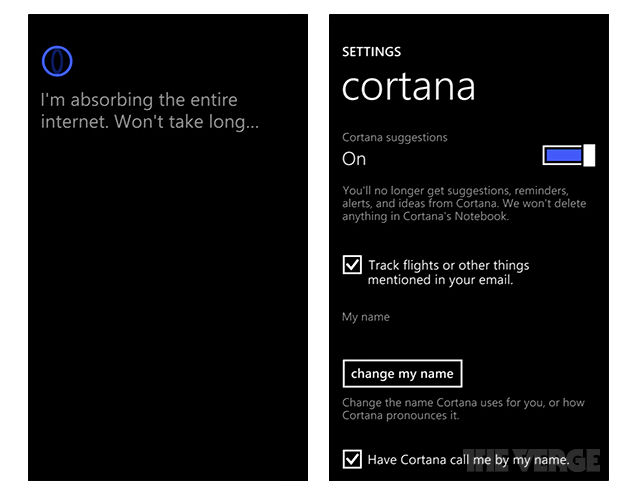The name Cortana comes from an AI character present in Microsoft's Halo game series. It's clear why Microsoft has chosen Cortana as a code name for its Windows Phone assistant, but it's worth making clear that in reality there's no link beyond the conceptual underlying idea.
On Windows Phone Cortana will be presented as a circular icon that animates when Cortana is thinking or speaking. Data and queries can be enter into Cortana using text input or voice control (search), but Cortana will also provide unsolicited prompts and reminders (actions). It's clear that Cortana is much more than just a search tool and is intended to have a character and something of a personality, though not one that will get in the way of the user experience.
Underneath the functionality is based on machine-learning technology and the "Satori" knowledge repository that powers Microsoft's Bing products. On Windows Phone a deeper personal dimension will be added as personal data (email, calendar, usage behaviour, and more) will be part of the dataset on which Cortana draws on, allowing the system to make more informed inferences about what you're doing and what you want (i.e. it will appear to "know" your personal habits and activities). This is similar to the way in which Apple's Siri voice control feature operates.
The most recent post on Cortana by The Verge notes that users will be able to customise what they call Cortana (e.g. "Bob") and a screenshots shows it will be possible to turn Cortana on or off, control whether Cortana calls you by your name, and control whether the system scans your email for relevant information (e.g. flights). This last feature would allow Cortana to present reminders and travel information for upcoming meetings and trips, operating in a similar way to Google Now.

Image credit: The Verge
An earlier post on The Verge detailed a key "Notebook" feature that will let users control what information is shared with Cortana. The idea here is to offer a level of privacy control, but it will also make more obvious the trade off between giving access to your data and the usefulness of a Cortana like assistant:
Notebook will allow the Cortana digital assistant to access information such as location data, behaviours, personal information, reminders, and contact information. We’re told it’s designed as a privacy feature to ensure Cortana doesn't freely access information without a level of user control. While Cortana will learn things about users, it won't store them in the Notebook without asking you, and any information that's stored can be edited or deleted. Cortana will then use this information to provide answers to search queries by voice or text, and provide suggestions, alerts, and reminders. Cortana could greet you by name and ask if you need help or answer questions, much like Siri.
Over time Cortana will be capable of learning more about its users and will, optionally, be capable of automatically offering reminders and/or tips. It will integrate with Windows Phone 8.1's revamped notification system and the new Quiet Hours (do not disturb) features, but is also expected to be used as a way to add semi-autonomous intelligence to other elements of the platform. Cortana is also expected to tie in with third party app, similar to the way in which current Windows Phone apps can be enabled for voice recognition. Initially this integration will be relatively simple (trigger actions, reminders, and queries), but in the future greater integration at the app data level is likely to be added.
